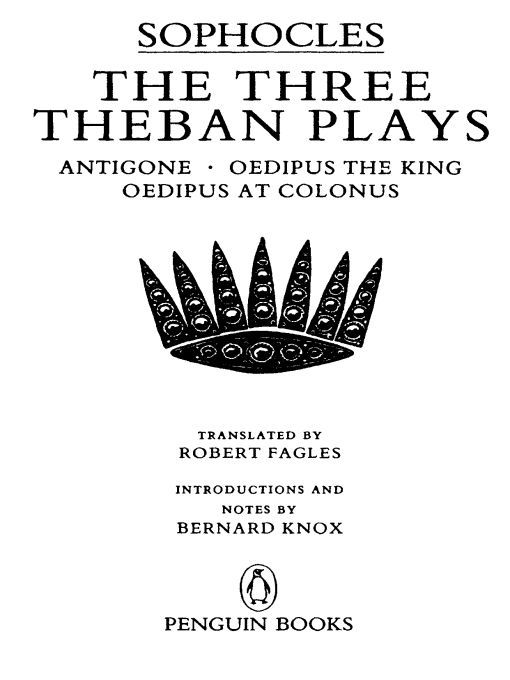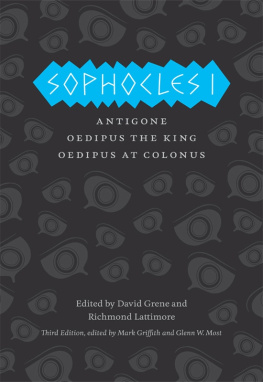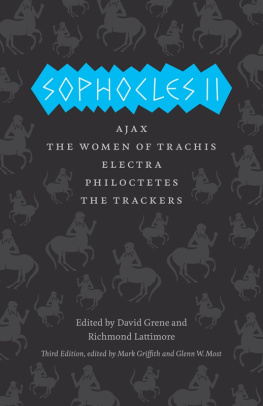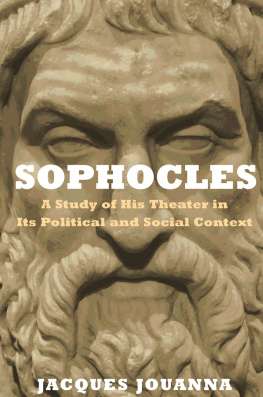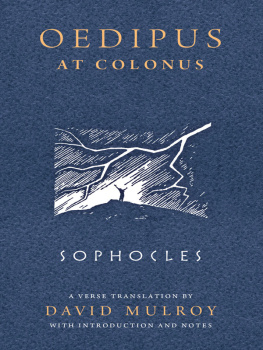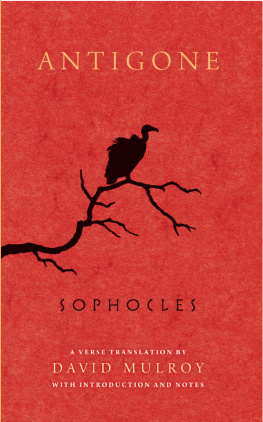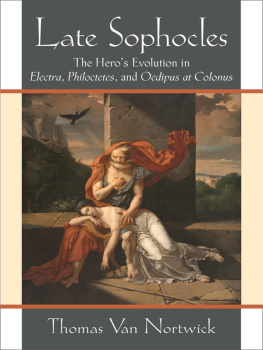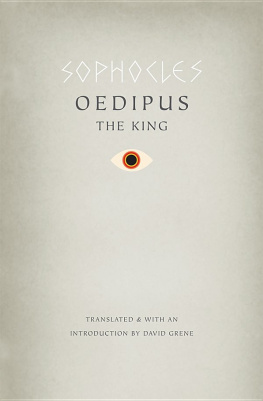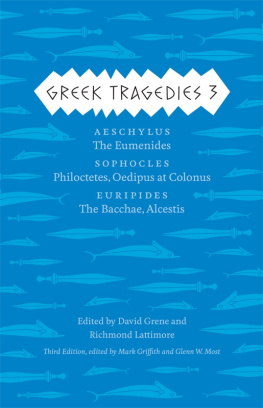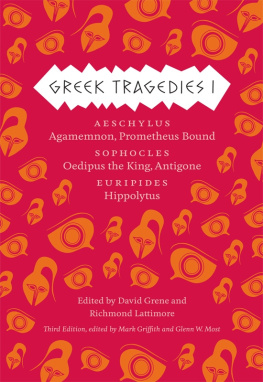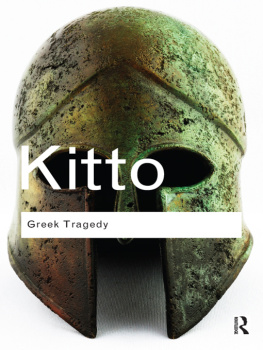Table of Contents
PENGUIN CLASSICS THE THREE THEBAN PLAYS ANTIGONE, OEDIPUS THE KING, OEDIPUS AT COLONUS
SOPHOCLES was born at Colonus, just outside Athens, in 496 B.C. and lived ninety years. His long life spanned the rise and decline of the Athenian Empire, he was a friend of Pericles, and though not an active politician, he held several public offices, both military and civil. The leader of a literary circle and friend of Herodotus, Sophocles was interested in poetic theory as well as practice, and he wrote a prose treatise, On the Chorus. He seems to have been content to spend all his life at Athens and is said to have refused several invitations to royal courts. Sophocles first won a prize for tragic drama in 468, defeating the veteran Aeschylus. He wrote over a hundred plays for the Athenian theater and is said to have won the first prize at the City Dionysia eighteen times. Only seven of his tragedies are now extant. Fragments of other plays remain, showing that he drew on a wide range of themes; he also introduced the innovation of a third actor in his tragedies. He died in 406-5 B.C.
ROBERT FAGLES is Arthur W. Marks 19 Professor of Comparative Literature, Emeritus, at Princeton University. He is the recipient of the 1997 PEN/Ralph Manheim Medal for Translation and a 1996 Academy Award in Literature from the American Academy of Arts and Letters. Fagles has been elected to the Academy, the American Academy of Arts and Sciences, and the American Philosophical Society. He has translated the poems of Bacchylides. His translations of Sophocles Three Theban Plays, Aeschylus Oresteia (nominated for a National Book Award), and Homers Iliad (winner of the 1991 Harold Morton Landon Translation Award by The Academy of American Poets, an award from the Translation Center of Columbia University, and the New Jersey Humanities Book Award) are published in Penguin Classics. His original poetry and his translations have appeared in many journals and reviews as well as in his book of poems, I, Vincent: Poems from the Pictures of Van Gogh. Mr. Fagles was one of the associate editors of Maynard Macks Twickenham Edition of Alexander Popes Iliad and Odyssey, and, with George Steiner, edited Homer: A Collection of Critical Essays. Mr. Fagles most recent work is a translation of Homers Odyssey, available from Penguin.
BERNARD KNOX is Director Emeritus of Harvards Center for Hellenic Studies in Washington, D.C. His essays and reviews have appeared in numerous publications and in 1978 he won the George Jean Nathan Award for Dramatic Criticism. His works include Oedipus at Thebes: Sophocles Tragic Hero and His Time; The Heroic Temper: Studies in Sophoclean Tragedy; World and Action: Essays on the Ancient Theatre; Essays Ancient and Modem (awarded the 1989 PEN/Spielvogel-Diamonstein Award); The Oldest Dead White European Males and Other Reflections on the Classics; and Backing into the Future: The Classical Tradition and its Renewal. He is the editor of The Norton Book of Classical Literature and has collaborated with Robert Fagles on the Iliad and the Odyssey.
FOR KATYA, FOR NINA
tois philois d orths phil
ACKNOWLEDGMENTS
GRATEFUL acknowledgment is made to the following for permission to reprint copyrighted material.
Basic Books, Inc., and George Allen & Unwin: A selection from The Interpretation of Dreams by Sigmund Freud, translated and edited by James Strachey. Published in the United States by Basic Books, Inc., by arrangement with George Allen & Unwin and the Hogarth Press, Ltd.
New Directions Publishing Corp. and Faber and Faber Ltd: Two lines from Ite from Personae by Ezra Pound. Copyright 1926 by Ezra Pound.
University of Chicago Press: A selection from The Iliad by Homer, translated with an Introduction by Richmond Lattimore. Copyright 1951 by The University of Chicago.
The illustrations throughout the book were redrawn by Ann Gold from photographs of Mycenaean ornaments and seals from Crete and Mycenae by Spyridon Marinatos, published by Harry N. Abrams, Inc., New York, New York. The motif of the crown is from a gold funerary diadem for a woman, discovered in Schliemanns grave circle; the procession is from a gold signet ring from the lower town at Tiryns.
TRANSLATORS PREFACE
I HOPE the translation will speak for itself, but not before I say a word of thanks to many people for their help. First among them is Bernard Knox. In addition to writing the introductions and the notes, he determined the Greek text that we have used and tried to hold me closely to its meaningtried, too, to make my English equal to the task. With countless comments on my work, as the work went through more versions than we can remember, he encouraged me to follow Pounds advice: Seek ever to stand in the hard Sophoclean light / And take your wounds from it gladly.
Others have helped as well. Robert Fitzgerald spoke for himself and Dudley Fitts and generously left the gates of Thebes ajar. Francis Fergusson shared his conversation and his counsel, as well as a telling stage direction for Oedipus the King. Several friends saw my drafts and offered me criticism or assent or a welcome blend of both: Nadia Benabid, Helen Bacon, Sandra Bermann, Toni Burbank, Rebecca Bushnell, Patricia Chappell, Robert Connor, Reginald Gibbons, Michael Goldman, Rachel Hadas, Katherine Hughes, Edmund Keeley, Nita Krevans, Jeffrey Perl, Richard Reid, Susan So, Theodore Weiss, Shira Wolosky and James Zetzel. Mrs. Robert Packer, my administrative aide, and Carol Szymanski lifted many burdens from my shoulders. Princeton University provided the leaves of absence that allowed me to finish the translation and, more important, the seminars in which I studied tragedy with my students.
From the outset, Alan Williams, my editor at The Viking Press, gave me his essential support. Elisabeth Sifton fortified my morale, Nanette Kritzalis, Anne Bass, Charles Verrill and Melissa Browne sped the production of the book, and many othersJuliet Annan, Nancy Gallt, Jean Griffin, Victoria Meyer and Constance Sayretreated it with energy and warmth.
As the book appears in Penguin Classics now, my thanks should go to several who are instrumental in the series. Betty Radice, the general editor, carefully read the plays in manuscript and sent me her valuable suggestions. Kathryn Court, my editor and mainstay for the new edition, Marcia Burch, Dan Farley, Edward Iwanicki, Linda Rosenberg, Serena Kahn, and Neil Stuartall were partisans of the translation in New York. With her fine style, Ann Gold designed The Three Theban Plays to be a companion volume to my translation of Aeschylus Oresteia. My English editor, Donald McFarlan, Peter Carson and Lorraine Cooper were gracious hosts at Allen Lane and Penguin Books in London.
Joined by Richard Simon, my agent Georges Borchardt used his skills and steady, heartening trust to find the book its home and help it on its way.
But the last word of thanks should go to Lynneti gar an kai meizoni / lexaim an e soi dia tychs toiasd in?
R.F.
Princeton, N.J.
1983
GREECE AND THE THEATER
IN THE sixth and fifth centuries before the birth of Christ an ancient civilization reached such heights of intellectual and artistic achievement that every succeeding period of Western culture, from the Roman Empire to the twentieth century, has been heavily in its debt, whether acknowledged or not. Those momentous years saw the beginnings of history and political theory (as well as political democracy) and the development of philosophical thought. In those years architects designed the temples which have dominated our concept of civic building ever since, and sculptors imposed on us an ideal vision of the human form which remains the point of reference even for those artists who turn against it. Not least among the achievements of this great age was the invention and perfection of an artistic medium which we take so unthinkingly for granted that we cannot imagine civilized life without itthe theater.

